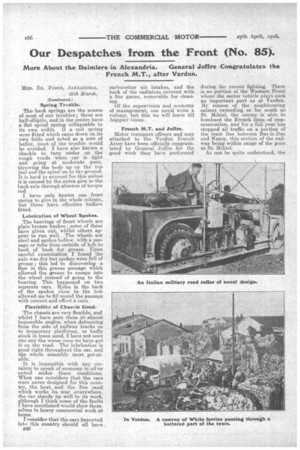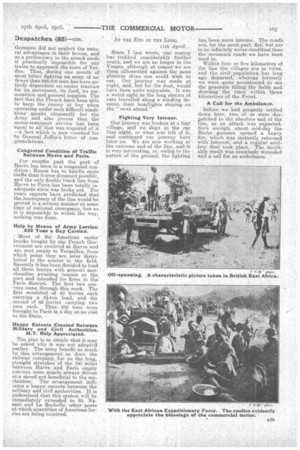Our Despatches from the Front (No. 85).
Page 4

Page 5

If you've noticed an error in this article please click here to report it so we can fix it.
More About the Daimlers in Alexandria. General Joffre Congratulates the French M.T., after Verdun.
MED. Fax. Foxes, ALEXANDRIA.
. 26th March..
(Continued.)
Spring Trouble.
The back springs are the source of most of our troubles ; these are half-elliptic, and in the centre have a" flat spiral spring collapsable to its own width. If a coil spring were fitted which came down on its own folds and acted as a sort of buffer, most of the -trouble would be avoided. I have also known a shackle to turn under on the rough roads when car is light and going at moderate pace, throwing the body up on the ton leaf and the spiral on to the ground. It is hard to account for this unless it is caused by the extra give in the . back axle through absence of torque rod.
I have only known one front spring to give in the whole column, but these. have effective buffers fitted.
Lubrication of Wheel Spokes.
The bearings of front wheels are plain bronze bushessome of these have given out, whilst others appear to run well. The wheels are steel and spokes hollow, with a nassage or tube from -outside of hill to back of bush for grease. Upon careful examination I found the axle was dry but spokes were full of grease ; this led to discovering a flaw in this grease passage which allowed the grease to escape into the wheel instead of going to the bearing. This happened on two separate cars. Holes in the back of the spokes close to the hub allowed me to fill round the passage with cement and effect a cure.
Flexibility of Chashis Good.
The chassis are very flexible, and whilst T have seen them at almost impossible angles, when detraining from the side of railway trucks on to temporary platforms, or badly stuck in loose sand, I have not seen one any the worse once we have got it on the road. The lubrication is good right throughout the oar, and the whole assembly most get-atable.
It is impossible with any certainty to speak of economy in oil 'or petrol under these conditions. When one considers that the cars were never designed for this country, the heat, and the fine sand which works its way everywhere, the car stands up well to its work, although I think some of the faults have mentioned would show themselves in heavy commercial work at home.
I consider that the cars imported into this country should all have Egg carburetter air, intakes, and the back of the radiators covered with a fine gauze, removable for cleaning.
Of the supervision and economy of management2 one eould write a volume, but this we will leave till happier times.
French M.T. and Joffre.
Motor transport officers and men attached to the Verdun French Army have been officially congratulated by General Joffre for the good work they have performed during the recent fighting. There is no portion of the Western Front where the motor 'vehicle plays such an important part as at Verdun. By reason of the neighbouring salient extending so far south as St. Mihiel, the enemy is able to bombard the French lines of communication, and for a full year has stopped all traffic on a portion of the main line between Bar-le-Due and Nancy, this section of the -railway being within range of the guns at St.
As can be quite understood, the
Germans did not neglect the natural advantages in their favour, and as a preliminary to the attack made it practically impossible for any trains to approach the town of-Verdun. Thus, during one month of most bitter fighting an army of no fewer than 250,000 men has been entirely dependent on motor traction for its movement, its food, its ammunition and general supplies. The fact that the French have been able to keep the enemy at bay when operating under such difficult conditions speaks eloquently for the Army and also proves that the motor-transport service ha S been equal to all that was required of it —a ,fact which is now vouched for by General Joffre's letter of con
. gratulations. '
Congested Condition of Traffic Between Havre and Paris.
For months past the port of Havre has been in a congested condition; Rouen has to handle more traffic than it ever dreamed possible, and the only double track line from Havre to Paris has been totally inadequate since war broke out. For years experts have predicted that the. inadequacy of the line would be groved in a serious manner at some time of national emergency, but as it is impossible to widen the way, nothing was done.
Help by Means of Army Lorries. 232 Tons a Day Carried.
s Most of the American motor trucks bought by the French Government are received at Havre and are sent empty to Versailles' from which point they are later distributed to the armies in the field. Recently it has been decided to load all these lorries with general merchandise awaiting transit at the port and intended for firms in the Paris district. The first two convoys came through this week. The first consisted of 40 lorries each carrying a 2i-ton load, and the second of 66 lorries carrying two tons each. Thus 2:32 tons were brought to Paris in a day at no cost to the State.
Happy Entente Created Between Military and Civil Authorities. M.T. Help Appreciated.
The plan is so simple that it may be asked why it was not adopted earlier. The army benefit as much by this arrangement as does the railway company, for on the long, straight stretches of the 150 miles between Havre and Paris empty convoys were nearly always driven at,a speed not beneficial to the mechamsm. The arrangement indicates a happy ententc between the military and civil authorities. It is understood that this system will be immediately extended to St. Nazare and La Rochelle, other ports at which quantities of American lorries are being received. , T THE END OF THE LINE.
ielb April.
Since I last wrote, 'our convoy has trekked considerably further south, and we are no longer in the Vosges, although at sunset we-see them silhouetted against the most glorious skies one could wish to see. Our journey was made at night, and, but for the dust, would have been quite enjoyable. It was a weird sight as the bug stream of cars travelled along a winding descent, their headlights shining on the "next ahead."
Fighting Very Intense.
Oir journey was broken at a tiny vill ge, and we slept in the car that night, or what was left Of it, and continued our journey here later on. We are now woriting at the extreme end of the line, and it is very interesting, as, •owing to the natUre of-the ground, the fighting has_ been more intense. The roads are, for the mast part, flat; but are in an infinitely worse condition than the mountain roads we have been used to.
Within four or five kilometres of the line the villages are in ruins, and the civil populationhas long ago departed, whereas formerly we were quite accustomed to see the peasants tilling the fields and dressing the vines within three kilometre's of the Front.
A Call for the Ambulance.
Before we had, properly settled down: here, two of us were despatched to the absolute end of the line, • as an attack was expected. • Sure enough, about mid-day the Beebe gunners opened a heavy. fire, which was instantly returned with interest, and a regular artillery duel took place. The inevitable result was -somebody wounded and a call for an ambulance.


















